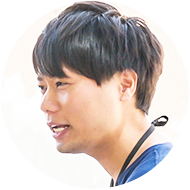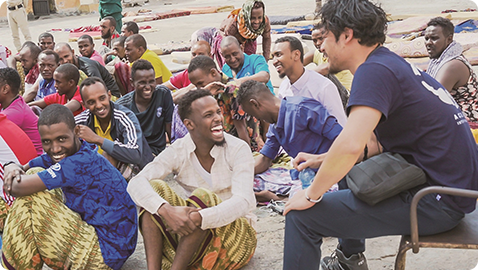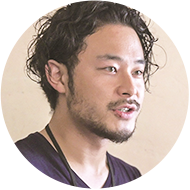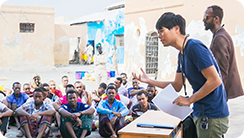The Story of NPO Accept International, Strengthening its Organizational Base
Supporting the reintegration of terrorists in four countries, including Somalia
Review organizational development through organizational assessment to clarify goals for the next 30 years
NPO Accept International

Aiming for a society free of terrorism and conflict, “Accept International” supports the de-radicalization and reintegration of terrorists and gangs in four countries, including Somalia. We asked them about the challenges they identified as a result of their organizational assessment, their long-term strategy for addressing these challenges, and their new initiatives for the international community.
[This is a re-edited version of an article originally published in No. 409 edition, THE BIG ISSUE JAPAN (June 15, 2021).]
De-radicalization of gangs and terrorists
Reintegration support is the key to solving the problem
Mr. Yosuke Nagai, Representative Director of “Accept International,” first became interested in Somalia in 2011. “In March, the Great East Japan Earthquake struck, and I volunteered to help remove debris in the affected areas. While Japan was receiving aid from all over the world, at the same time in Somalia, East Africa, about 250,000 people were losing their lives due to drought, famine, and terrorism caused by civil war, and I learned that not enough aid was reaching the area because it was a dangerous region.”
Mr. Nagai founded the “Japan Somali Youth Organization” in September of that year with two Somali university students who had fled to Japan from the conflict, with the idea that “if the adults of the world would not act, the youth themselves would solve the problem.” “I began by gathering local information by speaking with Somali youth who had fled to refugee camps in neighboring Kenya via online calls.”

NPO Accept International
Chief Director Mr. Yosuke Nagai

Reaching out to former gang and terrorist members to help them de-radicalize and reintegrate
Mr. Nagai realized that the key to resolving the conflict was to “de-radicalize gangs closely linked to terrorist organizations involved in robbery, murder, and drug trafficking, and to support their reintegration into society,” so he traveled to the region and began working there. “The gang was made up of young people around the age of 20, my generation at the time. When we were able to talk with them, we invited them to workshops, listening to their frustrations and calling on them to work together to change society; we managed to bring our relationship closer. In 2016, my activities also led to the dissolution of a large gang organization.”
In 2017, the name of the organization was changed to “Accept International” with the idea of “accepting rather than excluding,” and the organization became a non-profit organization. Currently, the program is working in Somalia, Kenya, Indonesia, and Yemen to assist terrorists, gangs, and other conflict parties in de-radicalizing and reintegrating, thereby increasing voluntary defections and preventing new recruits to terrorist organizations and other groups.
Mr. Nagai also serves as a “United Nations Human Settlements Program CVE (Countering Violent Extremism) Mentor.” He implements his own programs in the local community in cooperation with the United Nations.
“For example, our organization offers a program in Somali prisons three times a week, tailored to each individual, including surrendered soldiers and arrested terrorists. During the initial care counseling session, we spend an hour carefully listening to the individual’s past and the issues that led to the terrorist act, and then redefining them in a way that is socially acceptable.”
Challenges Identified in the Organizational Assessment
Sharing the Process to Achieve Goals
Accept International, in particular, works with them to develop strategies for dealing with the difficulties they will face in society after reintegration, provides vocational training in welding, sewing, computers, and so on, and invites outside professionals to hold dialogue sessions with them. “To date, 88 surrendered soldiers and 89 arrested persons have completed the program. We have given them certificates and 30,000 yen as a living allowance.”
The organization contacts family members and others to coordinate guarantors and connect them with realistic jobs such as household help or tuk-tuk (three-wheeled cab) drivers when they enter society. In addition, the organization also operates a youth center to prevent radicalization and a center that works with the Somali government to accept surrendered soldiers and arrested persons.
At first glance, Accept International’s activities appear to be smooth sailing. Still, Mr. Nagai says, “From its start as a student organization with an annual budget of 50,000 yen to the present, we have been self-styled in terms of organization and management.” “We’ve been working on fundraising since 2017, but it hasn’t worked out.”
Therefore, Accept International applied for an “Overseas Grant” from the “Panasonic NPO/NGO Support Fund for SDGs” and was selected to receive grants in 2020 and 2021.
“We hired an outside consultant to conduct an organizational assessment in 2020. First, the heads of divisions such as the overseas and domestic secretariats, as well as public relations, gathered for a thorough discussion of the organization’s vision and mission. Following that, stakeholders were organized, and the entire organization shared the process for accomplishing the goals, which had previously been restricted to the individual in charge. From there, we finalized the goals we wanted to achieve in 30 years.”
The findings revealed that, in addition to the “fundraising structure,” there were issues with “unclear plans for increasing staffing and business plans, development of meeting bodies, and establishment of volunteer management.”
“It became clear to us that it is critical to address issues other than finances, as well as how to utilize our strengths and unique characteristics. We are pleased that we were able to incorporate into our mid-to-long-term strategy the types of people to hire and teams to form in order to achieve our goal in 30 years.”
Supporting Young People’s Way of Life After Surrender
Aiming for the Establishment of a “Convention on the Rights of Youth”

NPO Accept International
Director of Public Relations and Fundraising Division
Mr. Tomoki Kawano
Based on this strategy, Mr. Tomoki Kawano, who was hired in 2020 as the “Director of Public Relations and Fundraising Division” with comprehensive responsibility for fundraising, describes the results of the grant.
“After working in sales for a company, I worked for JICA. Now that our goals and plans have been clarified, we can see a path toward improving our fundraising. By sharing the vision and mission with the entire organization, I began to think about what I was participating in the project for, and I have seen firsthand that each individual’s motivation has increased.”
“Accept International” has about 50 volunteers, called “members,” who pay an annual membership fee of 10,000 yen and meet once or twice a week to participate in activities with great enthusiasm. “In order to take full advantage of their strengths, which are also the strengths of the organization, we have increased the number of member general meetings from once a year to once a quarter. With the 2021 grant, we are working on a virtual board meeting where we invite experienced people from outside the organization to discuss ideas for management strategies.”
While the organization continues to work to resolve terrorism and conflict on the ground, it has also developed a new goal: to raise the issue with the international community. “Young people who become radicalized don’t have the words to speak for themselves. If we seriously aim for a world without terrorism and conflict, there is a limit to our activities alone. That is why I want to build on what we’ve already accomplished and ask the world.” said Mr. Nagai.
“With the adoption of the ‘Convention on the Rights of the Child’ in 1989, children’s rights are now better protected than ever before. On the other hand, young people in their late teens and twenties, who form the core of terrorist organizations, have been abandoned by the international community and have been jailed for long periods of time or executed. We have just started working to create a Convention on the Rights of the Youth within the next 10 years so that when they surrender and decide to pursue a different way of life, they will have a basis for doing so.”

[Organization Profile]
NPO Accept International
Founded the predecessor organization “Japan Somali Youth Organization” in September 2011. Accept International was established as a non-profit organization in April 2017. The organization’s goal is to combat terrorism and conflict in Somalia, Kenya, Indonesia, and Yemen by implementing “radicalization prevention projects” for areas and people at risk of radicalization, as well as “de-radicalization and reintegration projects” for those who have already become radicalized.

